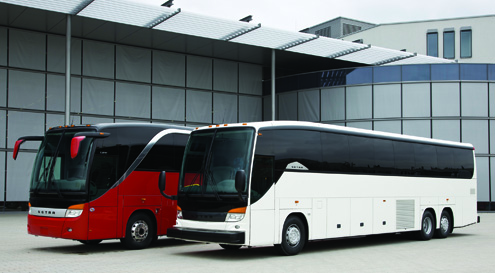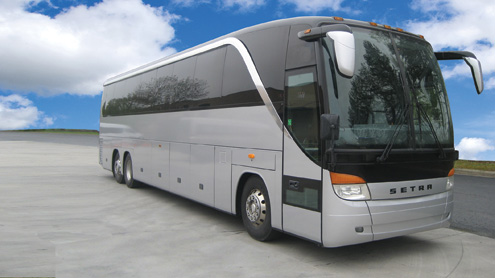
They‘ve made their move; the MCI and Daimler partnership forges ahead
By David Hubbard

Coach operators came to work on a Monday morning last July to hear that two leading competitors in the North American motorcoach market were choosing to partner up. Since then, Motor Coach Industries (MCI), Schaumburg IL, and Daimler Buses have worked to flush out and implement the details of their strategic partnership.
By this time, it has become common knowledge MCI is now the exclusive North American distributor of Setra motorcoaches. In addition to sales of the S 417 and S 407 models, the partnership gives MCI responsibility for service support and the distribution of genuine Daimler Buses and Setra parts, as well as the operation of the Setra service center in Orlando, FL.
With the deal inked later in the year, Daimler assumed a minority ownership position in MCI, forming an engineering, technology and manufacturing alliance as part of the agreement. The logistical challenges to make it happen then lay ahead.
The partnership has essentially entailed moving Daimler Bus in Greensboro to the MCI distribution center in Louisville, KY and MCI melding with the Setra Division in Neu Ulm, Germany.
Wolfgang Winzer, vice president and general manager, Aftermarket Business, says the move required trucking $4 million worth of parts inventory consisting of approximately 8,500 different parts numbers to the Louisville facility.
“MCI and Setra parts are now sitting side by side on the shelves,” says Winzer. “However, 95 percent of the Setra parts will still come from Germany. This creates an excellent opportunity for Daimler to bring in all the experience we have in supply chain management. Even with the distance, our parts distribution system allows us to make the correct product available to our customers from the Louisville facility when they need it.”

MCI Vice President, New Coach Sales and Pre-Owned Coach, Jon Yarusso is pleased to report that both teams have come a long way in a short time.
“It helped that many of the Setra staff in Greensboro transitioned to MCI,” he says. “This has brought stability and confidence to this endeavor.”
While the two companies were working to integrate all internal operations, which has included the consolidation of all the aftermarket support functions, Setra organized orientation and training sessions in Louisville for the MCI technicians to service the Setra coaches. Winzer says at least one, if not more, service technician who has gone through the training is now on staff at each of the MCI-Setra service centers.
The merger entailed closing two of the North American Setra service centers (Secaucus and Greensboro) and merging the MCI and Setra faciliies in Orlando, FL. Coaches arriving from Germany will undergo prep.
All this shuffling of parts and training techs is in advance of the question at the forefront: How will MCI position, market and sell the Setra S 417 and S 407 coaches so as not to compete with its E and J model 4500s?
“We asked ourselves what we were going to do with all these vehicles,” says Jon Yarusso. “We have thought this through from both sides and have come to a clear idea of what we intend for the Setra S 417.”
Generally, MCI sees the S 417 serving a greater number of coach operators who conduct business within the specialized niche of high luxury coach transport. He says that the plan will be to offer it as very high-end luxury brand it has always been, but with a few new wrinkles.
“As long as Setra has been marketed in North America, operators have not seen the levels of customization that is available the coaches in Europe,” says Yarusso. “There are some unbelievable options. Until now, Setra has not pushed these aspects in this market.”
Yarusso says Setra buyers can now choose from a menu of custom features that includes assorted seating configurations, onboard office amenities and service galleys. With the exception of a few demo coaches, Setra will essentially “build to suit” each S 417 for North American operators.
“This higher end approach is possible only through this new partnership,” he says. “It requires the economy of scale Setra gains through the larger support network of MCI. Selling 75 to 100 units annually, Setra could not support this lower sales volume on its own.”
Additionally, MCI says it can customize the S 417 because of Daimler Buses’ capability of building any model of any bus at any time on its unique factory assembly line in Neu Ulm — and deliver it to the U.S. conveniently and efficiently.
In contrast, while the MCI J4500 edges closer to its sibling in styling and amenities, the MCI E4500 will continue as the stalwart luxury choice for over-the-road the charter service, but without as much customization as is available with the S 417.
MCI says it has not fully flushed out its final positioning of the Setra S 407, originally imported to North America as Setra’s answer to the J model.
“Separating the S 407 from the J model poses a challenge,” says MCI Vice President Private Sector Sales and Marketing Pat Ziska. “Operators can use this coach in a similar way as the J4500, but all considered the S 407 hasn’t been as successful in this market.”
Yarusso says that at this time MCI sees the S 407 better serving operators in corporate and airport shuttles, and charters of shorter distances.
“This is an excellent opportunity for the luxury Setra represents to be more relevant in more places throughout the United States and Canada,” says MCI President and CEO Rick Heller. “The Setra brand succeeded in Europe and now MCI is committed and prepared to ensure it happens in North America.” BR
